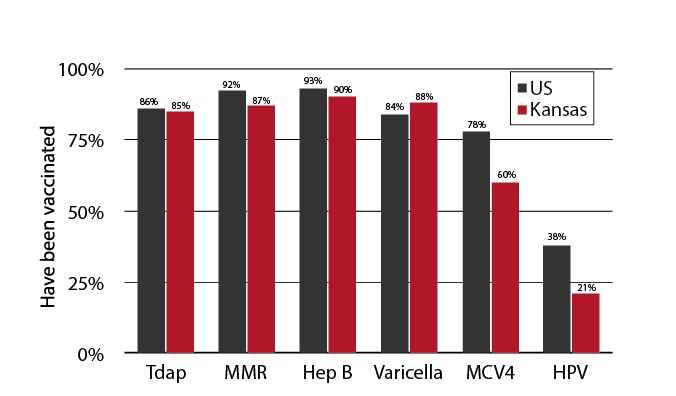Kansas avoids disease outbreak
Immunizations become hot topic, health officials look to reinforce standards
March 11, 2015
After being nearly eradicated for a generation, 102 cases of the measles were reported in the United States in January alone, according to the Center for Disease Control and Prevention (CDC).
Reports from January came from 14 states, including Colorado and Nebraska although there has yet to be a case in the state.
Headlines across the country have pointed to a possible underlying cause — a recent wave of parents questioning the necessity of vaccinations.
While the nation has deliberated on the recent measles outbreak and anti-vaccination movements, both the school district and the community have increased vigilance toward immunizations. State, county and public school health departments have encountered the debate and look to provide students with safe options.
Public education ensures that all students entering schools meet the determined immunity standards before they are allowed to attend school. Vaccinations are enforced at two main stages: upon entering kindergarten and entering high school.
According to the Douglas County Health Department, 80 percent of students entering kindergarten in 2012 were up-to-date on vaccinations. Most of those not included would have been vaccinated soon thereafter. However, the state of Kansas allows specific exemptions for immunization.
Nationally, immunization exemptions take three forms:
• Medical exemptions that generally stem from a drug allergy or being immunocompromised.
• Religious exemptions.
• Philosophical exemptions, meaning parents oppose vaccination without religious justifications.
Of those, Kansas schools only accept medical or religious exemptions.
There are 185 students within the district who are exempt from the measles vaccine — 176 for religious reasons, the remaining nine for medical reasons.
Medical exemptions require students to be annually-approved and signed-off on by a doctor, and those religiously-exempt need a parent to sign at the beginning of their public school career.
According to the Kansas Department of Health, 1.4 percent of incoming kindergartners in the 2012-13 school year were exempt from immunization.
Seventy-five percent of exemptions were religious.
These students are protected by the “herd effect,” which means there is immunity among the majority of students, who were immunized, so diseases are unlikely to persist among the population.
“We have a handful [of non-immunized students],” school nurse Carol Casteel said. “If there is a medical reason and they can’t get it, there is a protection because other people around them have immunity.”
However, the effect begins to break down if there are a high number of susceptible students in schools, so they attempt to keep the number of non-immunized children low.
“When children are exempt from vaccination and they are a close contact of someone with a vaccine preventable disease, they are at risk for contracting the disease and subsequently spreading the disease to unimmunized or under-immunized individuals,” Kansas Immunization Program nurse Patti Kracht said. “Therefore, it is important that the percentage of exemptions in school-aged children remain low.”
Although the state has not had any reported cases of measles, the Department of Health confirmed persistence of pertussis and varicella in schools across the state.
The Douglas County Health Department looks to get all citizens immunized and often has to sell the importance of vaccinations to skeptical parents.
Health Department nurse Janie Thornburg said that common apprehensions come from prejudices about the safety of the procedure and drugs, including a paper that came out in 1998 that suggested a link between the Measles, Mumps and Rubella (MMR) vaccine and autism. The link was disproved soon after, but the fear has not been entirely dissolved.
Department nurses look for ways to connect with parents to find health solutions.
“We talk to them about what could happen if they don’t vaccinate their child,” Thornburg said. “I think probably the most important thing is to build trust, build that relationship with the parents and tell them that they are safe and give them information about it.”
There are indisputable links between public health and socioeconomic conditions, however state health policy requires that local health departments put funds toward childhood immunizations to ensure that all entering the school system are eligible to attend.
According to the 2015 Dougas County Health Department budget, $160,368 will be put toward public immunization services. Families that are unable to afford regular services or that are uninsured are, by law, guaranteed vaccination and generally will also qualify for Medicaid or private financial assistance.
“Money should not be a factor when it comes to getting children immunized,” Health Department communications director Karrey Britt said.
In response to community health concerns about the measles outbreak, the Health Department hosted a series of public clinics that offered the vaccine throughout February and early March.
The vaccine is also offered on a walk-in basis at the Health Department facility at 200 Maine St.
“Vaccines have been one of the greatest public health achievements to prevent disease,” Kracht said.
“Parents today have a hard time understanding what it would be like if we did not vaccinate. I hope we do not have to find out.”














